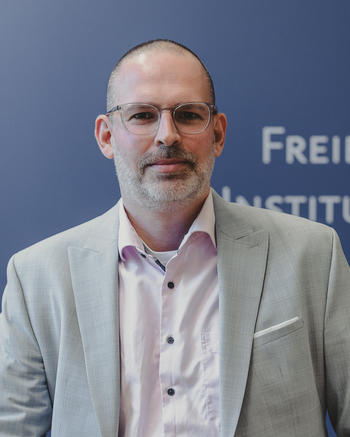Dr. Christoph M. Michael

Korea-Europe Programme
Institute of Korean Studies
Freie Universität Berlin
Korea Europe Review Senior Managing Editor
14195 Berlin
D.Phil. Martin-Luther-University Halle-Wittenberg, 2019 [supervised by Tony R. Judt (until 2010) and Harald Bluhm]
M.A.Phil., Humboldt-University, Berlin, 2005
Christoph M. Michael teaches political science with an emphasis on political theory and comparative politics. Prior to joining the Institute of Korean Studies (IKS), he was a Research Fellow at Rheinische Friedrich-Wilhelms-Universität, Bonn.
He held various other scholar- and fellowships, for example, as an early career Humboldt University research track scholar, a visiting fellow at NYU’s Remarque Institute, New York, and a doctoral fellow at the Center for European Excellence ‘Villa Vigoni’ in Loveno di Menaggio (CO), Italy.
At the Korea Europe Center, he is the senior managing editor of the interdisciplinary, international journal Korea-Europe Review (KER). He also regularly reports on manuscript submissions for Wiley, Routledge, Brill, Welttrends and Springer International. In addition, he has nearly two decades of experience as an academic translator and holds a teaching degree (TESOL) for English. His recent monograph Migration and the Crisis of Democracy in Contemporary Europe (Palgrave 2021) was choosen by the European Parliament EP Library as selected reading on EU policies on migration and asylum.
His research interests lie at the intersection of political theory, comparative politics, anthropology and the history of political thought.
Selected recent publications:
Migration and the Crisis of Democracy in Contemporary Europe. New York: Palgrave Macmillan, 2021. [Link to the publication]
This innovative and thought-provoking study puts forth a compelling analysis of the constitutive nexus at the heart of the European refugee conundrum. It maps and historically contextualises some of the distinctive challenges that pervasive ethnic and cultural pluralism present to real politics as on the level of political theorizing. By systematically integrating hitherto insufficiently linked research perspectives in a novel way, it lays open a number of paradoxical constellations and regressive tendencies in contemporary European democracy. It thereby redirects attention to the ways in which liberal thought and liberal democratic institutions shape, interact with, and may even provide justification for illiberal and exclusionary practices. This book thus makes an important contribution to the analysis of post-migrant realities in Europe and the ways in which they are defined by imperial legacies, punitive migration regimes, the culturalization of mainstream politics, and the discursive construction of a European Other.
"Refugees (un)make states": eine stabilitättheoretische Perspektive auf das europäische Flüchtlings- und Asylsystem. In: Politische Stabilität: Ordnungsversprechen, Demokratiegefährdung, Kampfbegriff, ed. by E.M. Hausteiner, G. Strassenberger, F. Wassermann (Leviathan Sonderband 36), Dec. 2020, pp. 217-237. [Link to the publication]
The article argues that the European refugee crisis emerges as a promising field of study only once the security-migration nexus is set aside. The analysis focuses on the Europeanization of national asylum and refugee regimes and the paradoxical situation it created in between member states’ «raison d’état”, the EU’s «raison de système” and the «raison d’humanité« of international humanitarian law. The article concludes that, in the long term, the predominance of the externalization approach endangers rather than strengthens both, the EU’s internal and external quest for stability.]
Special issue “Heimatkunden” Berliner Debatte Initial – Sozial- und Geisteswissenschaftliches Journal. Vol. 30, No. 3 (2019).
“Heimat Plural” In: Berliner Debatte Initial – Sozial- und Geisteswissenschaftliches Journal. Vol. 30, No. 3 (2019), pp. 5-16.
Special issue “Führen und Folgen: Autorität in der Demokratie“ (co-edited with Grit Straßenberger). Mittelweg 36, Vol. 27, No. 6 (Dec 2018/Jan 2019).
Special issue on “Flüchtiges Europa” (co-edited with Adrian Klein). Berliner Debatte Initial – Sozial- und Geisteswissenschaftliches Journal. Vol. 28, No. 4 (2017).
„Der gescheiterte Multikulturalismus und die Politisierung des Kulturellen [The failure of multiculturalism and the politicization of culture]“ In: „Flüchtiges Europa“ (co-edited with Adrian Klein). Berliner Debatte Initial – Sozial- und Geisteswissenschaftliches Journal. Vol. 28, No. 4 (2017), pp. 50-65.
